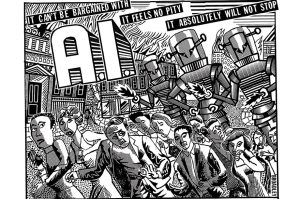It was the tweet posted by the New York Times that caught my eye: ‘Silicon Valley is backing a novel idea: instead of charging students tuition, students go to school for free and are required to pay back a percentage of their income after graduation, but only if they get a job with a good salary.’
It is all happening at the Lambda School, a new online learning start-up that this week won millions of dollars in backing from a glittering line up of venture capitalists – including Google Ventures, Ashton Kutcher, the actor turned Shark Tanker, and Geoff Lewis, an acolyte of Peter Thiel, the co-founder of PayPal.
According to the plan, students pay nothing up front but stump up 17 percent of their income for two years if they get a job that pays more than $50,000, relieving them of the prospect of taking on a lifetime of debt to get through college.
Quite brilliant. What a radical reimagining of the American education system.
If, that is, you have been living in a cave. You know what that sounds like to me? It’s a progressive levy to pay for a social good – or something rather like a tax. Our disrupting tech titans have come up with something so new that only the whole of the rest of the world has already heard of it. Drill down into the nitty gritty and it is a specific kind of levy known as a ‘graduate tax’, something mooted in the UK for at least a decade.
So spare me the hyperbole.
It is in fact just the latest in a long line of ideas ‘invented’ by tech disrupters. Look closer at Elon Musk’s proposed new transit system for Chicago – where electric trolleys will offer a 12-minute connection between the downtown Loop and O’Hare International Airport – and it is nothing more radical than a subway system, albeit one with smaller and cheaper tunnels.
When the ride hailing app Lyft announced its ‘shuttle’ service promising a fixed fare along convenient routes without ‘surprise stops’ the transport pioneer was immediate pilloried on social media for having just invented the city bus.
Last year a start-up proposed a system where neighbors could pool small amounts of money and then vote on how they wanted to invest it in their community. Did they not realize that’s how most of the democratic world works?
Whatever next? Printing internet pages on paper and posting them through your letter box each morning so you know what’s going on in the world? Pipes to your home that deliver bottled water into your glass? Cables that you plug your phone into for perfect reception?
It would all be a big joke if it weren’t for the way the examples highlight a glaring deficiency in Silicon Valley’s world view and the way it is pursuing its utopian dreams. When all the answers lie in the glowing screen before you, today’s big thinkers are divorced from real life, almost unable to understand the world around them.
How else to explain Mark Zuckerberg’s bizarre American tour in 2017 when he set out to travel around and just, you know, meet ordinary people. Rather than highlighting his intention to ground himself in reality it merely emphasized how out of touch he really was.
None of that matters if the world is a blank canvas on which to dream up novel ideas such as buses or taxes. Silicon Valley seems to still be in Year Zero, building it all from scratch.
But how much more productive if our best brains were applying themselves to real-world problems, working out the incremental fixes and system reforms that our broken-down world needs. Make our taxes more efficient or deploy that new tunneling technology not to build another transit system but to improve the existing, decrepit subways.
Not quite so glamorous, I guess.
As one wag put it succinctly on Twitter: ‘In the last couple years Silicon Valley has “invented” vending machines, buses, and, now, taxes, but I still can’t get a printer that doesn’t make me contemplate mass murder.’


















